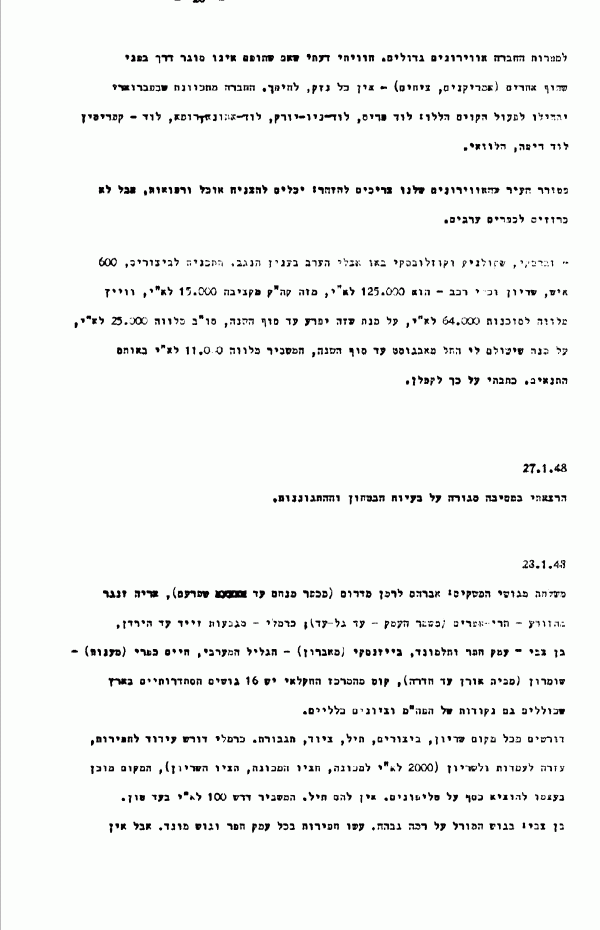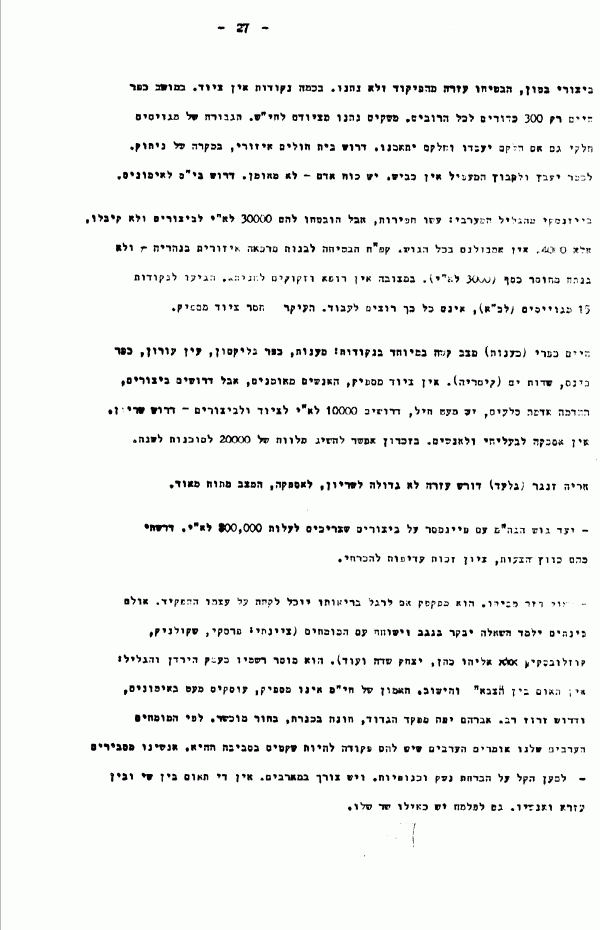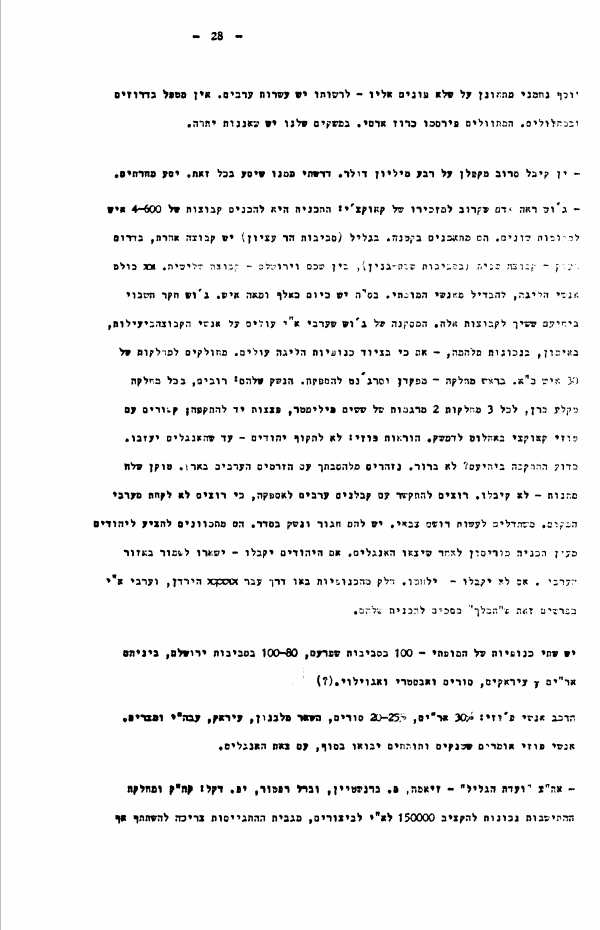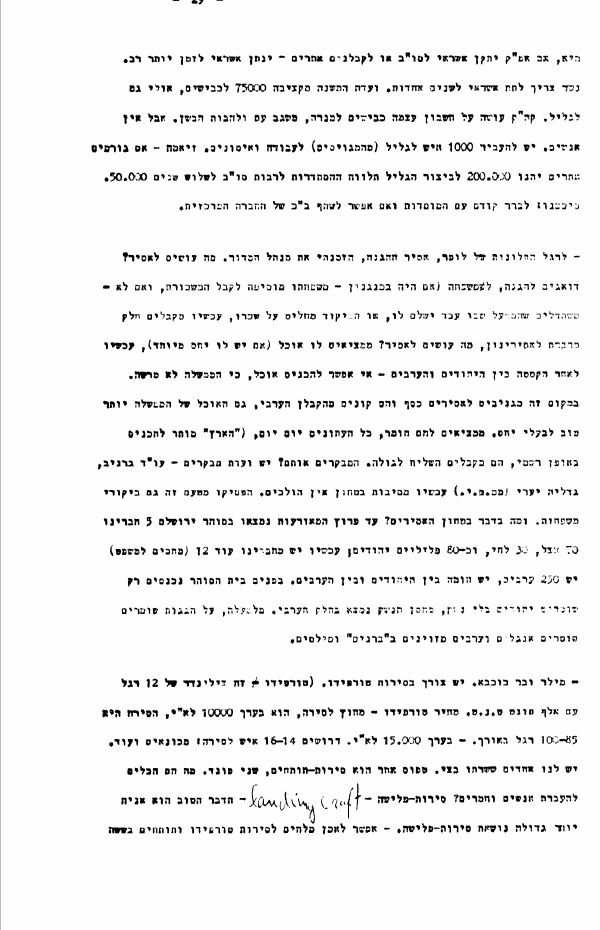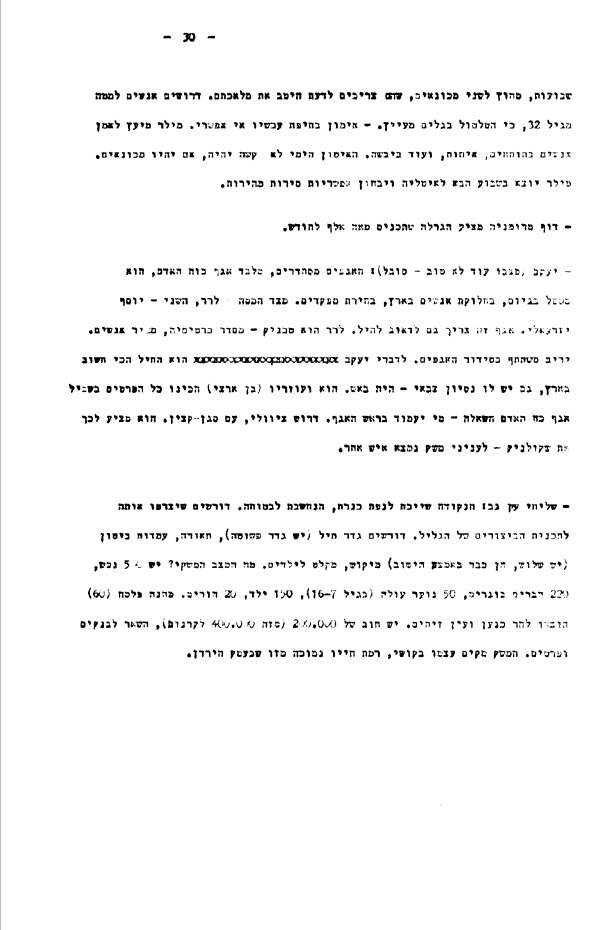1
of
Places:
Gvar'am
Bet Oren
Ma'anit
Evron
Tel Mond
Nahariya
Sdot Yam
Jerusalem
Meron
Nablus
Damascus
Egypt
Nesher
Haifa
Ein Gev
The use of the photograph is subject to the Copyright Law, 2007
28.01.1948
225356
Wednesday, 28 January 1948 A delegation from the settlements blocs: Avraham Lehrman from the south (from Kefar Menachem to Gvar’am, Aryeh Zinger [sp.] from HaZore’a [to] Mount Ephraim (from Mishmar HaEmek – to Gil’ad); Carmeli [Carmieli] – from Giv’ot Zaid to the Jordan [Jezreel Valley], Ben-Zvi – Emek Hefer and Tel Mond, Vizhansky [sp.] (from Evron) – Western Galilee; Haim Kafri (Ma’anit) – Samaria (from Bet Oren to Hadera), Kit from the Agricultural Center. There are 16 Histadrut-based settlement blocs in the country, which include HaPo’el HaMizrachi and General Zionist settlements. Every place is demanding armoring, fortifications, barbed wire, equipment, reinforcement. Carmieli [Ginegar] is demanding support for trench digging, assistance in outposts and armoring (P£ 2,000 for per machine [vehicle], half [the amount for] the machine, half the armoring). The place itself is prepared to provide the money for telephones. They have no barbed wire. HaMashbir is demanding P£ 100 per ton. [Haim] Ben-Zvi: The morale in the bloc [Emek Hefer] is high. They dug trenches throughout Emek Hefer and the Tel Mond bloc. But there are no concrete fortifications. The command promised help but didn’t deliver. A number of settlements have no equipment. The moshav Kefar Haim only has 300 bullets for all the rifles. Settlements gave some of their equipment to Hayish. A reinforcement of recruits will help, even if some of them work and some of them train. A regional hospital is needed, in case contact is severed. Kefar Yavetz and Kibbutz HaMa’apil lack a road. There is manpower – untrained. A training school is needed. Vizhansky [sp.] from the Western Galilee: Trenches were dug, but they were promised P£ 30,000 for fortifications and only received 4,000. There’s no ambulance anywhere in the bloc. Kupat Holim [the healthcare network] promised to build a regional clinic in Nahariya – and didn’t build for lack of money (P£ 3,000). There are no doctors in Matsuba and they need them in Hanita. 15 recruits have arrived in (each of the) the settlements. They don’t really want to work. In particular – equipment is lacking. Haim Kafri (Ma’anit): An especially difficult situation in the settlements: Ma’anit, Kefar Glikson, ‘Ein ‘Iron, Kefar Pines, Sdot Yam (Caesarea). Not enough equipment. The people are trained, but fortifications are needed. The soil is rocky, there’s [too] little barbed wire, P£ 10,000 are needed for equipment and fortifications. Armoring is needed. There are no provisions for animals and people. In Zikhron [Ya’akov] it’s possible to get a loan of 20,000 for the [Jewish] Agency, for a year. Aryeh Zinger [sp.] [from Gal’ed] needs a little help for armoring, supplies. The situation is very tense. – The Upper Galilee Bloc Committee with Feinmesser [sp.]: Spoke about fortifications that should cost P£ 800,000. I demanded that they scale down the proposals and give preference to what’s imperative. – Shaul [Avigur] returned from his home [Kinneret]. Considering his health, he doubts whether he could take on the position [of Negev governor]. But in the meantime he’ll study the issue, visit the Negev, and speak with the experts (I mentioned: Perski [Shimon Peres], Shkolnik [Eshkol], Kozlowski [Sapir], Eliahu Cohen [Ben-Hur], Yitzhak Sadeh, and others). He conveys his impressions from Emek HaYarden and the Galilee: There’s no coordination between the “army” and the Yishuv. The garrison force training is inadequate; they focus [too] little on training and need a lot of spurring on. Avraham Yoffe, commander of the battalion stationed at Kinneret, is a skilled man. According to our Arab experts, the Arabs say they have an order to keep quiet in that area. Our men explain [that this is] in order to make things easier for weapons smuggling and gangs. There’s a need for ambushes. There isn’t enough coordination between SHAI [operationally] and Ezra [Danin] and his men [the Arab division of SHAI]. The Palmach has a pseudo-SHAI of its own. Yosef Nachmani complains that he’s not being approached – he has tens of Arabs available. He doesn’t handle Druze or Metualim [Shiite Muslims in the Upper Galilee, on both sides of the border]. The Metualim issued a malicious flyer. There’s too much complacency in our settlements. – Ian [Yannai, head of Signal Service] received a rejection from Kaplan regarding a quarter of a million dollars. I instructed him to travel anyway [to the US]. He’ll leave in two days. – Josh [Yehoshua Palmon] saw someone who’s close to Qawuqji’s secretary [who said]: The plan is to bring in groups of 400-600 man at various locations. They’re training in Qatna [Syria]. In the Galilee (around Mount Atzmon [Meron]) there’s one group, in the southern Valley – a second group (around Nablus-Jenin), between Nablus and Jerusalem – a third group. All are members of the [Arab] League, as opposed to the Mufti’s men. In total there are about 1,100 men at present. Josh interrogated the POW in Yehiam, who belongs to these groups. Josh’s conclusion is that Eretz-Israel Arabs surpass the members of this group in terms of efficiency, training, preparedness for war – although in terms of equipment the League’s gangs surpass [Eretz-Israel Arabs]. They’re divided into platoons of 30 men each, at the head of each platoon – a commander and supply sergeant. Their weapons: rifles; each platoon has a Bren machine gun; for every 3 platoons [company] two 6 mm mortars, hand grenades for attack; they’re linked with Fawzi Qawuqji by wireless to Damascus. Fawzi’s instructions: Not to attack the Jews – until the English leave. Why [was there an] attack in Yehiam? Not clear. [Fawzi’s men] are being careful not to clash with the Arab groupings in the country. Touqan [mayor of Nabus] sent [them] gifts – not received. They want to establish contact with Arab supply contractors because they want to avoid taking from local Arabs. They’re trying to create the impression of a military. Their gear and weapons are fine. They’re planning to propose a “Morrison Plan” of sorts to the Jews after the English leave. If the Jews accept it – they’ll stay to guard the Arab area. If they don’t – they’ll fight. Some of the gangs came by way of Transjordan, and Eretz-Israel Arabs interpret this as meaning that the “king” agrees to their plan. There are two gangs of the Mufti’s – 100 [men] near Shfar’am, 80-100 near Jerusalem. Among them – locals, Iraqis, Syrians, an Austrian, and a Yugoslav. The composition of Fawzi’s men: 30% from the country, 20%-25% Syrians, the rest from Lebanon, Iraq, Transjordan, and Egypt. Fawzi’s men say that tanks and cannons will eventually come, when the English leave. – In the afternoon the “Galilee Committee” – Ziama [Aran], P. Bernstein, and Berl Raptor: According to [Yosef] Dekel: KKL and the [Jewish Agency] Settlement Department are willing to allocate P£ 150,000 for fortifications. The fundraising campaign also needs to participate. If the Anglo-Palestine Bank grants credit to Solel Boneh or other contractors – the credit will extend for a longer period of time. Nesher [a cement factory] needs to give credit for a few years. The subcommittee is allocating 75,000 for roads, maybe also for the Galilee. KKL is building roads at its own expense to Manara, Misgav ‘Am, and Lehavot HaBashan. But there are no men [for work]. We need to transfer 1,000 men to the Galilee (from the recruits) for work and training. Ziama: If other bodies give 200,000 for fortification of the Galilee, the Histadrut, including Solel Boneh, will lend 50,000 for three years. We agreed: First to clarify with the institutions, and if possible to include a representative of the Central Company. In light of complaints by [Mordechai] Laufer, Haganah prisoner, I summoned the department director [Yehuda Carmel]. What is being done [for] the prisoner? – They’re ensuring [legal] defense, for the family (if he was in the [career personnel] apparatus) his family continues to receive a salary, and if not – they try to have the factory where he worked pay him, or the command decides on his salary. Currently some [of the payment] comes from Le’Asireinu [an aid association for Haganah prisoners]. What is being done to the prisoner? – He’s provided with food (if his sentence includes “special treatment”); right now, following the fight between Jews and Arabs [in the Jerusalem prison], it’s not possible to bring in food because the government doesn’t allow it. Instead, money is being smuggled to the prisoners and they buy [food] from the Arab contractor. The government food is also better for those with “special treatment.” They’re provided with material, all the newspapers every day (Haaretz can officially be brought in). They also receive LaShaliah BaGolah [Haganah information bulletins]. Are they visited? – There is a visitors committee – Adv. [Zvi] Bar-Niv, Gedaliah Ya’ari [sp.] [Jerusalem Workers Council]. Right now, for reasons of security, they don’t go. Family visits were also suspended for this reason. And what about prisoners’ security? – Before the riots erupted, there were 5 of our members, 70 ETZEL, 30 LEHI, and about 80 Jewish criminals at the prison in Jerusalem; now there are 12 more of our members (waiting for trial). There are 250 Arabs. There is a wall between the [area of the] Jews and the Arabs. Only Jewish soldiers, unarmed, enter into the prison. The weapons arsenal is located on the Arab side. On the rooftops there are English and Arab policeman serving as guards, armed with Brens and Mills [grenades]. – [Commander] Miller and Bar-Kochba [Meirovitz]: [We] need torpedo boats. (Torpedo – a 12 foot cylinder with a thousand pounds TNT). The price of a torpedo, aside from the boat, is about P£ 10,000. The boat is 85-100 feet long. Costs about P£ 15,000. We need 14-16 men per boat: mechanics etc. We have a few [men] who served in the navy. Another type is the cannon boat [cannon carrier], two pounds [37 mm]. What are the means of transferring people and materials? – Landing craft. The best thing is a larger boat that carries landing craft. Sailors can be trained for torpedo boats and cannon [boats] in six weeks, aside from two mechanics, who need to know their craft very well. We need people below age 32 because the turbulence from waves is tiring. Right now training in Haifa is impossible. Miller recommends training men in cannons, signaling, etc., on land. Naval training won’t be hard, if there are mechanics. Miller leaves for Italy next week and well explore options [for buying] fast boats. – Doff [sp.] from Romema suggests a lottery that would bring in 100,000 per month. – Ya’akov [Dori] (his condition still isn’t good – he’s suffering): The [General Staff] departments are shaping up, aside from the Personnel Department. [This department] handles conscription, personnel placement across the country, selection of commanders. It includes Lehrer [Moshe Zadok] on behalf of the Staff, and second – Yosef Yizraeli. This department also has to provide services for the soldier. Lehrer is a “technician” – arranges documents, knows people. [Col.] Green is taking part in the organization of departments. According to Yaakov he’s the most important soldier in the country, and also has military experience – was in the line of fire. He and his assistants [Ben-Artzi] handled all the details for the Personnel Department. The question is: Who will head the department? It needs to be a civilian, with a deputy – officer. He recommends Shkolnik [Eshkol]. For economic matters we’ll find someone else [in place of Shkolnik]. – ‘Ein Gev delegates: The settlement is part of the Kinneret subdistrict, which is considered secure. They demand to be included in the Galilee fortification plan. They demand barbed wire (there’s a simple fence), lighting, concrete barricades (there are three, which are now in the middle of the settlement [since it expanded]), mine laying, a bomb shelter for children. What’s the settlement’s situation? – There are 500 people, 220 adult members, 50 immigrant youth (ages 7-16), 150 children, 20 parents. A Palmach camp (60) was relocated to Har Canaan and ‘Ein Zeitim. There’s a debt of P£ 200,000 (40,000 of it to foundations), the rest to banks and private parties. The settlement barely sustains itself; its standard of living is below that of Emek HaYarden.





